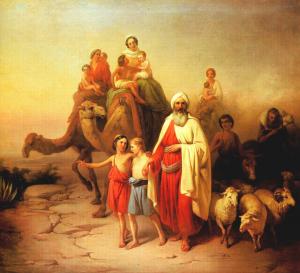
When philosophers and theologians talk about the existence of God, they talk about God in general. They do this in such a way that believers from various different religious traditions employ the same arguments to prove God exists without concern for the particular ways God is understood by different religious traditions. They not only share a belief in the existence of God being demonstrated by particular arguments, they do so without thinking the other does not really believe in God. They know they are all talking about God and so share some sort of belief in the same God. St. Thomas Aquinas could borrow from arguments for the existence of God from Jews and Muslims because they share a belief in one God in common. This does not mean they believed the same things about God, but they did not think they needed to in order to address the basic arguments in favor of theism. Indeed, the fact that people can believe the wrong things about God indicates it is the same God being discussed and worshiped, otherwise, if different beliefs meant different objects of belief, no one could be in error about God, for they would not be talking about him.
St. Paul followed a similar line of thought. On Mars Hill, he was able to point to “the unknown God” (cf. Acts 17:23) of the Greek philosophers and say that the God which was represented by the Greeks as “the unknown God” is the same God which he came to proclaim. Likewise, Paul was capable of saying that everyone could know of the existence of God through natural revelation (cf. Rom. 1:20-21). This would not make sense if people had to know all the attributes of God as God had revealed himself to the Jews for them to know and worship him. Coming to know and understand there is one God over all, who transcends all things and so is incomprehensible to us, is enough to hold to and seek after the one God. Certainly, what we apprehend of God through the light of natural reason will not be able to know exactly the same thing about God as God reveals himself to be in his personal act of revelation to his creation. There is no way to talk about “Do you believe in God?” if these secondary considerations are required to believe in God: since most people, indeed, all of us, will be wrong about some things about God, we would have to say we do not worship God if we want to follow through and demand our understanding of God has to be error free for us to worship him.
Early Christian apologists understood this. They suggested that people outside of the Christian faith could be shown to believe not only in God, but in Christ; not in the sense of knowing Christ as he was revealed to us in the incarnation, but in the sense that Christ was the Logos who was able to be apprehended, to some extent, by reason and all those who sought after the truth through reason sought after Christ. St. Justin Martyr is famous for declaring many pre-Christian philosophers as “Christians” because they followed after and worshiped the Logos; what they received from the Logos was but a seed of the truth, but because they took it in and nurtured it, they were capable of serving the Logos, and so Christ; this mean that the truths which they had were not only worthy of respect, but were to be incorporated into the Christian faith as its proper home is with Christ. Or, as John Garvey wrote:
In Justin’s words, we see a different approach from those Christians who have argued that there are no truths at all outside of Christianity. He says that all truth belongs to the Christians because God, through the Word, is the source of all truth, and the Word who took on human flesh in Christ is the fullness of all human truth. But those who even unwittingly have participated in this truth are in some sense in communion with it, however imperfectly, and this is because “seeds of the Word (Logos)” are found everywhere.[1]
Christians do not have to believe non-Christians are totally without truth; indeed, they do not have to believe non-Christians are without some connection to God. Obviously, what that connection will be will be different depending upon the person. Atheists and agnostics, so long as they authentically pursue the truth, will find themselves learning from the source and foundation of the truth, God, sometimes more authentically than so-called Christians. Likewise, those who believe in one ultimate source or foundation for being will have an understanding of God, some in a very broad sense, but others in an acute religious sense with some notion of a creator- God. There are those who not only believe in one creator-God, and that manner talk about and worship God, but also have a sense that God is a personal God who has revealed himself in history. Finally, there are those who recognize that historical God as being revealed through Abraham, and so all those who follow the Abrahamic tradition, not only believe in the same God, they share a tradition together, even if that tradition finds itself diversified in various, possibly contradictory, fashions. Jews, Christians, and Muslims, among others, must be seen as worshiping the same God, not only because they are focused on one theistic God, but because they accept a common tradition concerning God. Those who follow the Abrahamic tradition, when they reflect upon God theologically, will come to share a common understanding of what it means for God to be the ultimate, transcendent source of being. But it does not have to stop there. Many of them, in common, have come to understand that the worship of God, though connected with the terms used to describe God, transcends those names, because, as Bede Griffiths explained, such names are themselves mere signs which to point to that transcendent God:
Finally God himself, in so far as he can be named, whether Yahweh or Allah or simply God, is a sign, a name for the ultimate Truth, which cannot be named. [2]
Pope St. Paul VI, reflecting upon these relationships, looked to various circles of thought which circle around the truth of God. The further out those circles lie, the less truth is contained in the religious beliefs of those involved, allowing for critical reflection from those who possess greater elements of the truth.[3] Christianity is encircled by Judaism, which is encircled by Islam, which is encircled by various other religions, with “African spiritual religions” being at the outer-circle of those Paul VI mentioned. The Christian-Jewish-Muslim circle, nonetheless, share the tradition of Abraham, and so Christians are to respect Jews and Muslims for holding to and being connected to the revelation tied to salvation history. Christians should not only hold them in respect, but cherish them, even pray for them, which is what Paul VI said he himself would be doing: “We ourselves shall offer an example today by praying for non-Christians, especially for those who, deriving their beliefs from father Abraham, enjoy special spiritual kinship with our faith: the Jews, and in addition to them, the Muslims also.”[4] Christians, Jews, and Muslims share a common spiritual heritage, and should see each other in that light, instead of the hostility which has been found in the past. Christians need to reject anti-Semitism as well as Islamophobia; both are grounded on the same unchristian hate and fear of the other which Jesus consistently spoke against when he talked about our duty to love everyone, including those we would deem as our enemies. Those who attack Jews disgrace themselves and the Christian faith just as much as those who would deem Muslims worship “demons.” If Jews are not trustworthy, then how can we accept the Torah? If Muslims, who offered philosophical and theological proofs for the one God which others like St. Thomas Aquinas used to discuss God, worshiped Satan, should that not say that Christians like Aquinas are likewise worshiping Satan because they borrowed from the Muslims?
Because of our close connection to Jews and Muslims as being the three major heirs of the Abrahamic tradition, we should look to them as spiritual brethren who should be treated with the respect we would give to members of our family. We share a sense of history with them; as various accounts of history change according to the person telling it, it should not be surprising different perspectives will come out which are in conflict with each other, but that conflict comes out of the common ground which precedes any such conflict. Christians must come to terms with this common ground; they must accept that others, too, worship God, perhaps not with the fullness of revelation, but yet with an honest worship which ties them to God. Bede Griffith said it best: “…God is revealing himself at all times to all men in all circumstances. There is no limit to the grace of God revealed in Christ.”[5] When we try to impose that limit on God, we will be the ones finding ourselves turning away from God because we will be denying whatever truth God has revealed to others.[6]
[1] John Garvey, Seeds of the Word: Orthodox Thinking On Other Religions (Crestwood, NY: St. Vladimir’s Seminary Press, 2005), 86.
[2] Bede Griffiths, The Marriage of East & West (Springfield, IL: Templegate Publishers, 1982), 42.
[3] See Pope Paul VI, “To the Faithful at the Angelus Domini. Rome, Oct. 17, 1965” in Interreligious Dialogue: The Official Teaching of the Catholic Church (1963- 1995). Ed. Francesco Gioia (Boston: Pauline Books and Media, 1997), 140.
[4] Pope Paul VI, “To the Faithful at the Angelus Domini. Rome, Oct. 17, 1965,” 140.
[5] Bede Griffiths, The Marriage of East & West, 38.
[6] Obviously, this should not be read to indicate all religions and religious practices are the same. Far from it. The ultimate revelation is in the incarnation, in God becoming human. All these other revelations point to, and are comprehended by, the revelation given to us in the incarnation.
Stay in touch! Like A Little Bit of Nothing on Facebook.
If you liked what you read, please consider sharing it with your friends and family!













